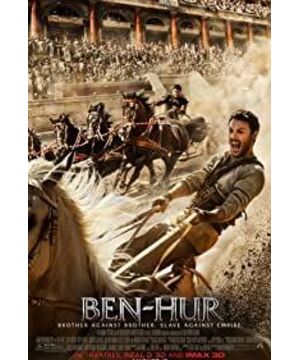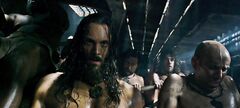I once told my friends that Boyd was set like a vicious reception in Binxu, but he brought the loyal dog attack attribute in the record of the fall, probably because Heston's temperament is so upright that he is unlikely to be overwhelmed (always the Bible The natural choice for the prophet and the hero of the epic, has played a series of big figures such as Moses, John the Baptist, Binxu, Cid, General Gordon, etc.), and Plummer's lion head Kang Maod is a little bit enchanting, yin and yang.
Back to this film. Even though the plot can no longer be more familiar, and the psychological presuppositions have been made, the whole film is basically calm, but at the end of the moment when Messara hugged Binxu and the dagger fell to the ground, I was shocked. From the 19th century In the 21st century, Bin Xu has been going around for so many years, from the original novel to the silent film to the 59 year movie to the TV series to the stage drama to this latest version of the movie. One day he will be able to see this life and death enemy HE on the big screen! HE sincerely and without pretense. The screenwriter unexpectedly made the two of them recklessly. Mesala also followed Bin Xu away. This world occupied by doujin really won't be better!
Yes, doujin. I personally think that the latest version of Binxu is just as good as a 59-year movie comrades. You don’t need to be too serious about the original version. Originally, the 59th version is not absolutely faithful to the original novel. The story of Binxu will always be in the video adaptation version. The details are rewritten, from the silent film in 25 years to the movie in 59 years to the four-episode TV series in 10 years to the latest version of the movie in 2016.
Three major adaptations of the latest edition of Binxu: Messara becomes Binxu's foster brother; Pilate's army, the governor of the Jewish province, was actually attacked from upstairs of Binxu's house when they were patrolling in Jerusalem (washing white Mesala); Binxu After saving the Roman general Quintus Arius in the naval battle, his adoption paragraph was deleted.
I actually have the biggest opinion on the third adaptation, because the fusion of Jewish and Roman identities after Bin Xu was adopted by Arius is particularly symbolic and metaphorical. The deletion of the Roman role of Arius also made the image of the Romans in the film even more unilateral and deteriorated (the opposite was the case in the 10-year TV series, where Arius was described in detail, although the effect was not good).
One point to be pointed out in particular: Corresponding to the gradual whitewashing of Messala’s image, Pontius Pilate’s image is gradually tarnished. Anyway, Jesus was crucified during his tenure, so it’s okay for him to carry all the scapegoats on his back? For example, the person who was accidentally hit was not actually him. It was not him who caused the disaster at Binxu’s family, but his predecessor, Valerius Glatus, but in the 10th edition, this person has become Pilar. Many, in this film Pilate was furious after being shot by an assassin with a bow and arrow, and became the main person responsible for the disaster at the Binxu family. After that, the image of this character was declining all the way, because Mesala was beaten in the abandoned Binxu mansion. , It is necessary to smash the Jews 20 to 1.
The following mainly discusses the evolution of the image of Mesala in the video history of the Binxu story.
The 59th edition has a very important adaptation of the original novel, which is to rewrite the character of Mesala in a good way. In Wallace’s original book, there is no Mesala Benxu who went to see him before his death and was told that his mother and The scene in which Tasha is still alive, because in the novel, Mesala did not die of serious injuries immediately after the car, and his frame of Benxu did not stop abruptly. Mesala and Glatus were also deleted from the movie. The embezzlement of Binxu’s family property deleted Meisala’s mistress, and replaced it by strengthening Meisala’s feelings for Binxu, or a special love. Remember that the director’s commentary mentioned that Meisala has a homosexual tendency. So when the director told Boyd about the play, he wanted him to show affection to Heston, but everyone kept the word from Heston, fearing that Heston would get angry when he knew it (Heston must be a tough guy).
The 59 version of the resulting many intriguing dialogues:
Mesala, who has returned to Jerusalem, said to Binxu, how sad the unrequited love is!
After Bin Xu was arrested, his housekeeper, father and daughter, came to intercede, and his father said, I know him, he would never do such a thing. Mesala said, I know him better than you.
Mesala, who was shattered and lost in the chariot race, said, how could I have my legs amputated before I saw him? I know he will come.
The dying Messara said, who is the person in front of you that you saw, a broken body enemy? Bin Xu replied, there are no enemies in front of me.
"Unrequited love", Mesala consciously trusts and disappoints expectations. This is an important psychological factor for the 59 version of Mesala to betray Binxu. To put it bluntly, he was consciously rejected and betrayed first.
The 25-year silent film is colder than the original. In the original, at least Mesala and Binxu have a conversation that seems to be love but is foreshadowing after their adult reunion. In the silent film, Mesala has no love for Binxu long before the reunion. Now, Messara is a purely ambitious, cruel and unforgiving image. In the 59-year movie, the love between the two protagonists who fell in love and killed each other is self-evident. By the way, Boyd drank a cup of wine with Brother Sum when he became an enemy, and he also drank with Kang Maod in the Record of the Fall.
Since the scene of this dying confrontation, subsequent editions like to make a fuss about it. From the 59 edition of Boyd’s Messara until he died, he was stubborn and unrepentant without asking for forgiveness (the doctor wanted to cut his leg for treatment, but he was unwilling to use The mutilated body showed weakness in front of Bin Xu and firmly refused to agree to amputation), until 10 years in the TV series SCM’s Messara insisted on getting Bin Xu’s forgiveness before she died. In this latest version, it is for mutual understanding (and Messara was also amputated) One leg), it can be considered as a process of development... Or maybe the image of Messala has been evolving and gradually washed out since it was put on the big and small screens?
In the original work, Messala actually came from a Roman nobleman (see Messara's surname). His father was a financial and tax official in Jerusalem. Messala was able to interact with the Benxu family as a child because of the royal family of Judah. In the background, their parents used to work together in the same palace left by Herod on Mount Zion. Because Greek was very popular in Judean’s upper class and academy at the time, Messala and Binxu used Greek instead of Latin, the native language of the Romans, Messala took the path of a very normal Roman aristocratic youth, receiving orthodox aristocratic education, studying classical academics, entering the army, making contributions, and being in the "level of glory". (Cursus honorum) climbs steadily.
Messara’s family background was not introduced too much in the '59 film, but in 10 years of TV series Messara has been downgraded to an illegitimate son who desperately needs to be recognized by the family. This latest movie version simply turned him into a betrayal. The orphan of the executed Romans and the adopted son of the Binxu family. This rewriting is diametrically opposite to the original. In the original, I remember to confess the background of Messara: the outbreak between the first generation of Caesar and his archenemy In the war, his grandfather once followed Brutus and reconciled with the victor after the Battle of Philippi. After that, he stood firmly on Octavian's side and supported him. Later, Augustus did not forget him. The friendship granted the family all the glory. When Judea was compressed into a province, Augustus sent his old friend's son to Jerusalem to manage the taxation and financial income of this area. This son is the father of the young Mesala.
Even so Mei Sala life experience development are all evolving, always interested in everyone adaptation Mei Sala for more than Ben-Hur, whether because the villain is always interesting than the positive role it ......
constantly washed at the same time, Mei Sala's The image is actually weakened all the way.
Constantly giving him excusable and easy-to-understand motives (the illegitimate child status in the 10th edition brings pressure to rectify the name, and the 16th edition gives him the identity of the adopted child who is difficult to recognize and integrate with the double barriers of blood and race, which makes this Both versions of Messara have a strong motivation to go out and make contributions to gain identity and win personal glory. Messara’s behavior is more passive and forced rather than proactive), which also weakens the world empire he represents. Expansion and aggressiveness in Roman nature. The Rome in the Tiberius era was the Rome of the early empire. Even if it is a sun, it is far from the Age of Dark Iron in the Commod era. As a Roman son from a noble family, Messala embraced Romanism, Rome-centric worldview, and the education and Romanization he received after returning to Rome, which inevitably made him and Binxu who returned to Jerusalem as an adult. Parting ways and showing the appearance of a powerful and invader is the inherent attribute of the nation and class to which he belongs. The contradiction between Messala and Binxu is irreconcilable, because their contradiction is not purely personal hatred, but the fundamental opposition between the expanding Rome and the Jewish nation being suppressed by aggression. Messala did not regret until his death that he did not realize that he was wrong and would never ask forgiveness and forgiveness. This kind of toughness is in line with the temperament of a Roman son, the clear and frank sin, the sin in the sun, the Bacchus-style passion and cruelty. In the 59th edition, Binxu finally understood Mesala. After his death, it was also because he understood the limitations of Mesala. People are social people, national people, and class people, rooted in his life. The soil cannot stand in the air, surpassing all this. In contrast to Mesala’s inability to transcend the attributes of race and identity, the 59 version of Li Binxu merged Jewish and Roman identities in the name of Little Arius. But what this integration brings is not necessarily reconciliation, it may also be confusion.
View more about Ben-Hur reviews











